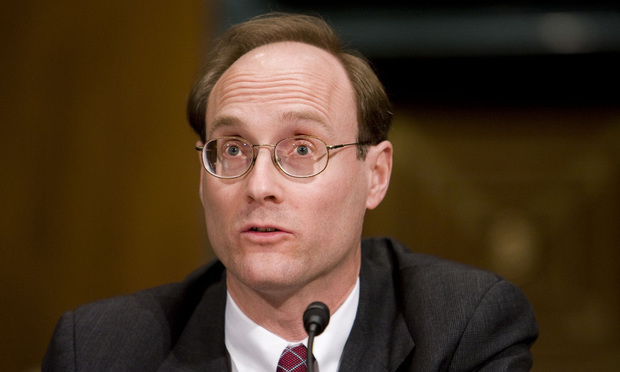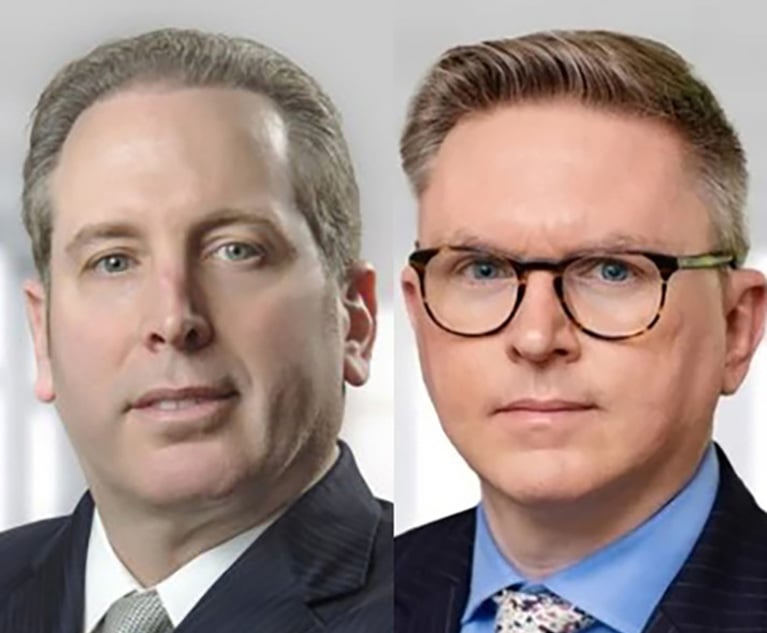Loeb Ordered to Comply With Subpoena, But Need Not Foot Entire Bill, Judge Rules
Judge Paul Engelmayer said that should they choose to pursue the subpoena, brothers Aaron and Eric Goodwin would have to pay all of Los Angeles-based Loeb's costs,
June 12, 2019 at 05:13 PM
3 minute read
 U.S. District Judge Paul Engelmayer. Photo: Diego M. Radzinschi/ALM
U.S. District Judge Paul Engelmayer. Photo: Diego M. Radzinschi/ALM
Loeb & Loeb must comply with a subpoena in a Delaware bankruptcy proceeding, but would not have to foot the entire bill for producing a trove of records related to work it did on behalf of an ex-client, a Manhattan federal judge has ruled.
Judge Paul Engelmayer of the U.S. District Court for the Southern District of New York said Tuesday that, should they choose to pursue the subpoena, brothers Aaron and Eric Goodwin would have to pay all of Los Angeles-based Loeb's costs, including the bulk of the firm's fees for reviewing an estimated 25,000 documents responsive to the subpoena.
The order ended a stalemate between Loeb and the Goodwins, who served the firm with a subpoena in March for information regarding a $20 million loan that Loeb's former client, XIII Capital, made to finance Decade SAC's 2016 purchase of two sports agencies the Goodwins owned.
According to court filings, the documents were central to a dispute in Decade's Chapter 7 bankruptcy case in Delaware over whether shares in the Goodwins' companies were validly transferred to Decade, and thus part of its estate. The Goodwins have countered that the transfer was the product of fraud.
Loeb, however, had resisted the subpoena in part because the firm had represented XIII Capital in its civil suit stemming from Decade's failure to repay the loan. The firm was replaced as XIII's counsel in May 2018, and the case remains ongoing.
In addition to being overly broad, Loeb said most of the documents the Goodwins sought were protected by attorney-client privilege and could not be turned over. Compliance, the firm also argued, would be unduly burdensome when the firm was not even a party to the bankruptcy dispute. According to Loeb, each document would have to be reviewed for privilege, a task it estimated would take about 50-attorney days to complete.
On Tuesday, Engelmayer said the documents were “plainly relevant” to the Delaware case, but also acknowledged that Loeb's burden for producing the records was “substantial.” The issue in the bankruptcy proceeding, he said, was “purely a private matter,” and would present an opportunity cost for Loeb if it used its own employees to conduct the search, review and production of responsive documents.
“An order requiring the Goodwins to bear costs and fees associated with the production and review of the documents at issue will incent them to tightly focus the subpoena's demands and to consider maximally efficient means of document review. It will further encourage the Goodwins to judge, at the threshold, whether Loeb likely possesses enough non-privileged documents of consequence to the Adversary Proceeding to justify undertaking extensive … discovery,” Engelmayer wrote in the 12-page opinion.
Under the fee-shifting arrangement, Engelmayer said the Goodwins would reimburse Loeb at $150 per hour for attorneys and $75 per hour for nonlawyer personnel, after the first 25 hours of work that each group put into the project.
It was not clear on Wednesday afternoon if the Goodwins would proceed with the subpoena. Attorneys for both sides were not immediately available to comment.
Loeb was represented by Evan Farber, a partner in the firm's New York office. The Goodwins were represented by Keith William Miller, Adam Ross Mandelsberg and Gary Frederick Eisenberg of Perkins Coie in New York.
The case was captioned In Re Subpoena to Loeb & Loeb.
This content has been archived. It is available through our partners, LexisNexis® and Bloomberg Law.
To view this content, please continue to their sites.
Not a Lexis Subscriber?
Subscribe Now
Not a Bloomberg Law Subscriber?
Subscribe Now
NOT FOR REPRINT
© 2025 ALM Global, LLC, All Rights Reserved. Request academic re-use from www.copyright.com. All other uses, submit a request to [email protected]. For more information visit Asset & Logo Licensing.
You Might Like
View All


Law Firms Expand Scope of Immigration Expertise Amid Blitz of Trump Orders
6 minute readTrending Stories
Who Got The Work
J. Brugh Lower of Gibbons has entered an appearance for industrial equipment supplier Devco Corporation in a pending trademark infringement lawsuit. The suit, accusing the defendant of selling knock-off Graco products, was filed Dec. 18 in New Jersey District Court by Rivkin Radler on behalf of Graco Inc. and Graco Minnesota. The case, assigned to U.S. District Judge Zahid N. Quraishi, is 3:24-cv-11294, Graco Inc. et al v. Devco Corporation.
Who Got The Work
Rebecca Maller-Stein and Kent A. Yalowitz of Arnold & Porter Kaye Scholer have entered their appearances for Hanaco Venture Capital and its executives, Lior Prosor and David Frankel, in a pending securities lawsuit. The action, filed on Dec. 24 in New York Southern District Court by Zell, Aron & Co. on behalf of Goldeneye Advisors, accuses the defendants of negligently and fraudulently managing the plaintiff's $1 million investment. The case, assigned to U.S. District Judge Vernon S. Broderick, is 1:24-cv-09918, Goldeneye Advisors, LLC v. Hanaco Venture Capital, Ltd. et al.
Who Got The Work
Attorneys from A&O Shearman has stepped in as defense counsel for Toronto-Dominion Bank and other defendants in a pending securities class action. The suit, filed Dec. 11 in New York Southern District Court by Bleichmar Fonti & Auld, accuses the defendants of concealing the bank's 'pervasive' deficiencies in regards to its compliance with the Bank Secrecy Act and the quality of its anti-money laundering controls. The case, assigned to U.S. District Judge Arun Subramanian, is 1:24-cv-09445, Gonzalez v. The Toronto-Dominion Bank et al.
Who Got The Work
Crown Castle International, a Pennsylvania company providing shared communications infrastructure, has turned to Luke D. Wolf of Gordon Rees Scully Mansukhani to fend off a pending breach-of-contract lawsuit. The court action, filed Nov. 25 in Michigan Eastern District Court by Hooper Hathaway PC on behalf of The Town Residences LLC, accuses Crown Castle of failing to transfer approximately $30,000 in utility payments from T-Mobile in breach of a roof-top lease and assignment agreement. The case, assigned to U.S. District Judge Susan K. Declercq, is 2:24-cv-13131, The Town Residences LLC v. T-Mobile US, Inc. et al.
Who Got The Work
Wilfred P. Coronato and Daniel M. Schwartz of McCarter & English have stepped in as defense counsel to Electrolux Home Products Inc. in a pending product liability lawsuit. The court action, filed Nov. 26 in New York Eastern District Court by Poulos Lopiccolo PC and Nagel Rice LLP on behalf of David Stern, alleges that the defendant's refrigerators’ drawers and shelving repeatedly break and fall apart within months after purchase. The case, assigned to U.S. District Judge Joan M. Azrack, is 2:24-cv-08204, Stern v. Electrolux Home Products, Inc.
Featured Firms
Law Offices of Gary Martin Hays & Associates, P.C.
(470) 294-1674
Law Offices of Mark E. Salomone
(857) 444-6468
Smith & Hassler
(713) 739-1250







